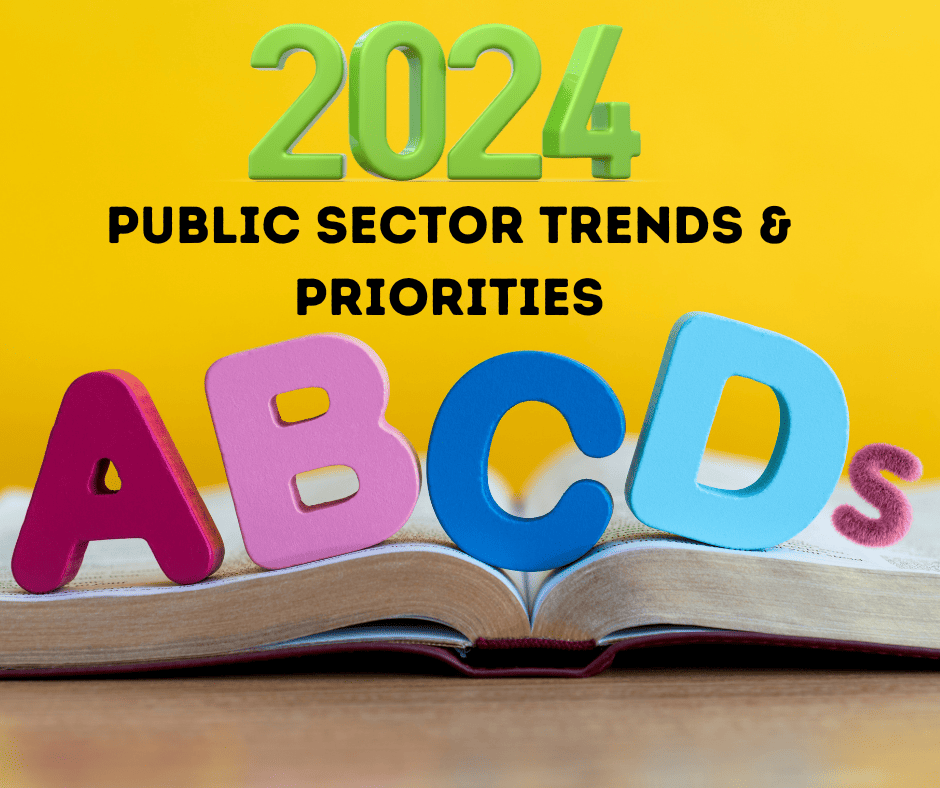The ABCDs of Public Sector trends and priorities in 2024

Public Sector trends and priorities in 2024
As we embark on the journey of 2024, the public sector finds itself at the crossroads of unprecedented challenges and opportunities. Join us on this insightful journey as we delve into each facet of the ABCDs, exploring how these trends intersect and synergise to create a blueprint for a responsive, efficient, and inclusive public sector.
A
Artificial Intelligence
In 2024, the government will continue to discuss and manage the delicate balance between fostering innovation in AI and addressing the potential risks and challenges of AI. As the use of AI continues to grow across all areas of government, including policy and regulation, national security and defence, and services to the public, governments will be turning their attention to ensuring the responsible and ethical development of AI, through legislation, regulation and protection intervention training for analysts.
AI in the public sector – 5 benefits and 5 limitations
Agile governance
2024 will see an increase in the adoption of agile rituals and practices to drive decision-making, project management, and overall organisational responsiveness. This trend involves embracing iterative and collaborative approaches to policymaking and service delivery, allowing government agencies to manage lessons and respond more effectively to changing requirements and feedback.
B
Build – Infrastructure Development
The infrastructure development agenda in 2024 is a comprehensive effort by the government to build the physical and digital foundations necessary for sustained economic growth and ensure the seamless provision of essential services to the public. Top priorities for infrastructure development will be transportation (noting the National Partnership Agreement on Land Transport Infrastructure Projects expires on June 30, 2024), utilities, clean energy, space and technology. The future focus of the Federal Government for infrastructure projects is based on productivity, economic security, sustainability, and liveability.
C
Capability – of Agencies and their workforce
A renewed focus to ensure that public sector agencies are future-facing and have the right skills and expertise will be big in 2024. For some agencies, this will include building up in-house consulting expertise which will require the acquisition of new staff and the capability uplift of current staff. While the demand for external consultants will continue, there will be a greater focus on the integrity and performance of consultants in 2024.
Cybersecurity
In the face of advancing cyber threats, the imperative to formulate and execute resilient cybersecurity strategies becomes increasingly crucial. These measures are essential to protect sensitive citizen data and uphold public confidence.
Change Management and Collaboration
In the ever-changing landscape, government agencies consistently adopt and maintain effective change management practices. Historically, change management was handled internally within individual agencies, leading to isolated implementations. However, in 2024, a shift is anticipated, with agencies engaging in collaborative change initiatives to collectively tackle significant challenges.
Compliance
Ensuring adherence to regulations and policies remains a key focus in 2024, with the aim of fostering public trust and confidence. Public trust can be achieved through straight-forward, transparent practices and robust monitoring and reporting mechanisms, such as:
· defining clear performance metrics, key indicators, and benchmarks.
· implementing automated systems for real-time monitoring of government activities.
· conducting risk assessments to pinpoint potential areas of non-compliance.
· integrating compliance monitoring with overall performance management systems.
Corporate Plan Compliance Template
Climate Change and Sustainability
In 2024, the public sector will continue to discuss climate change and implement sustainable initiatives. Government agencies will review their sustainability practices in areas such as procurement, encourage the adoption of a circular economy to minimise waste and support recycling, and develop policies that encourage the use of renewable energy sources such as solar, wind, hydro, and geothermal. Net zero will still be a trending term; however, in 2024, sustainability is moving beyond carbon neutrality to include the role of nature and biodiversity – where companies will start to consider and report on the impacts of their business on nature. You will also see the rise in the term ‘social sustainability’- often referred to as ethical sustainability – or the People part of the Triple Bottom Line approach of People, Planet, and Profit.
A guide on how to get started in sustainable procurement
Crisis Management Planning
The pandemic has shown governments, especially health agencies, just how important crisis response planning is. Effective governance and decision-making around crisis management will be a strong focus in 2024. Disaster season is starting earlier each year and is lasting for longer – Australia is unique in having floods, torrential rain, cyclones and bushfires all at once. Contingency planning is becoming more and more important to deal with multiple crises in short succession or concurrently.
Reflecting on the lessons from crisis management and rapid recovery
D
Digital Transformation
Digital transformation in the public sector in Australia is aimed at enhancing the efficiency, accessibility, and responsiveness of government services, as well as improving citizen engagement and fostering innovation in public service delivery. Read more on Government’s Data and Digital Strategy 2030
Government entities in 2024 will continue to adopt cloud computing (and the use of data lakes) including Software as a service (SaaS), data analytics, and artificial intelligence, which will empower them to make data-driven decisions, optimise resource allocation, and provide more personalised and efficient services to the public. To do this, they will continue to build digital and data capability and invest in procuring digital infrastructure.
Data Analytics and AI
Governments will continue to embrace the transformative potential of Data Analytics and Artificial Intelligence (AI) to enhance decision-making processes and improve public service delivery. Data analytics tools allow government agencies to efficiently analyse vast amounts of information, uncover valuable insights, and make data-driven decisions across various sectors. AI applications will continue to automate routine tasks, streamline high-volume, low value-add processes, and enhance citizen services. Advanced analytics provide predictive capability so early interventions can occur, and Australians can always access the government services they need.
Data Governance and Privacy
Ensuring privacy and data security while leveraging data for better decision-making will remain a key concern in 2024. The Australian government is planning to overhaul national privacy laws and introduce amendments in 2024. Some states are also reviewing and updating Privacy laws. There will be an amplified focus on data governance in 2024 due to the changing regulatory landscape, with government organisations reviewing their governance models and processes early on in 2024.
Governance Maturity in Australia
S
Strategic Planning
How are governments going to adapt to these future trends? Strategic plans will help governments anticipate and adapt to future trends. Strategic plans provide a roadmap for governments to achieve long-term goals and will help governments respond to changing circumstances and emerging challenges, whether they be economic, social, technological, or geopolitical. Governments must be agile, data-driven, and responsive to evolving needs and challenges.
Reach out to our public sector experts to discuss your challenges and opportunities in 2024 hello@grosvenor.com.au







 We are all about sharing our expertise to help you and your organisation be the best it can be.
We are all about sharing our expertise to help you and your organisation be the best it can be.